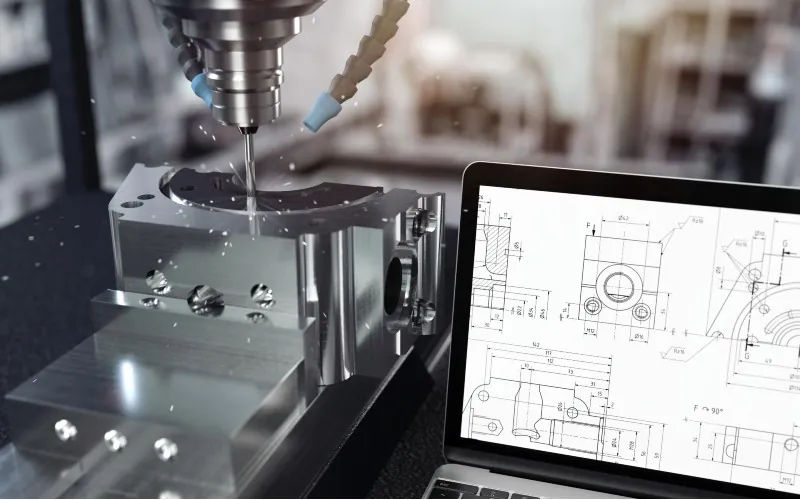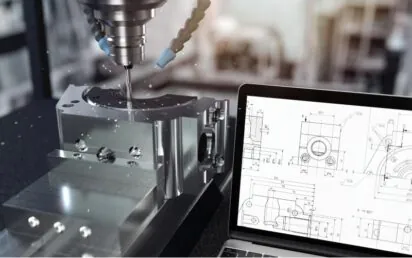Welcome to our FactoryTech Insights report for 2024.
Published alongside our annual FactoryTech 50 ranking, the report quantifies and reflects technology trends in manufacturing.
After our readers and an expert judging panel together decided the UK’s most innovative startups, scaleups and established technology firms serving the sector, we canvassed views from the companies.
Trends
We asked the FactoryTech 50 and judging panel to describe a particular trend they have noticed in manufacturing technology in the last year.
Judge Kevin Smith (below) is lead technology advisor at Made Smarter UK, which has engaged with 2,500 manufacturers on the benefits of tech and digital skills since launching in the North West five years ago.
“Over the past year, there’s been a significant move towards enhanced data collection in manufacturing, driven by the adoption of IoT (Internet of Things) technology and analytics,” he says.
“This trend is all about using data to make smarter decisions, improve efficiency and cut downtime.”

The data trend is a view shared by Stephen Mitchell, CEO and founder of SQCDP.co.uk, which debuted at No.14 on the ranking. The Newcastle startup has developed an app & software platform allowing manufacturers to remove problem paperwork from their factory areas.
“This, I believe, is being driven by increased manufacturing costs and awareness of Lean manufacturing,” he explains. “We are receiving queries from businesses that need to modernise at an affordable price-point so that they can increase competitiveness by reducing overall manufacturing costs.
“Companies are certainly exploring this space so that they can continue to be profitable.”
The IoT has emerged as a “cornerstone of smart manufacturing”, says Irma Gilbert, CEO of Autentica Industrial Platforms Ltd. The Blackpool firm, an NFT marketplace for 3D-printed automotive aftermarket spare parts, featured in 17th spot on the ranking.
This, she argues, facilitates the seamless integration of sensors and devices into operational processes: “This interconnected network enables real-time monitoring, data collection and analysis, leading to agile decision-making and improved productivity.
“Moreover, the migration to cloud infrastructure has unlocked unprecedented scalability, flexibility, and accessibility for manufacturing operations. Cloud-based solutions offer robust data storage, processing capabilities, and collaborative tools, fostering innovation and agility within organisations.”
FactoryTech 50 – UK’s most innovative manufacturing technology creators for 2024
Keith Tilley, CEO at Nottingham-based Intoware, has also witnessed an increased adoption of Industrial Internet of Things and sensor-based technologies, especially for predictive maintenance and condition monitoring.
Fourth on this year’s ranking, Intoware is behind WorkfloPlus, digital instructions and onboarding software for industrial workforces.
“However for many there are still assets that do not have that capability and they tend to move to more digitalisation of processes that can capture the data,” he adds.
Intoware – Take the first steps on your digital transformation with WorkfloPlus
Coming trends
As for a trend she expects to see in the coming 12 months, Gilbert says the advent of Web3 technologies is poised to redefine the relationship between manufacturers, suppliers and consumers. “Decentralised distributed production platforms and protocols are ushering in a new era of transparency, trust and autonomy, enabling peer-to-peer transactions and value exchange without intermediaries.”
Bijan Kiani (below), CEO of Oxford-based Machine Discovery, says he expects to see “accelerated adoption of AI technology to enable the junior workforce to complete complex tasks”.
The firm, 36th on the FactoryTech 50, is behind neural network technology to accelerate expensive calculations with minimal data and high accuracy.

Mitchell says higher energy costs in the market are impacting manufacturers and “they are reacting wherever they can to reduce costs… I expect that there will be an increase in demand for innovative energy-saving solutions for electricity and gas”.
Gilbert also expects to see accelerated adoption of additive manufacturing – or 3D printing – catalysing the development of ‘digital warehouses’, which store 3D models readily available for on-demand production.
“These repositories will empower manufacturers to swiftly respond to customer needs and market demands. Secure 3D printing ecosystems will encompass a network of trusted partners, including designers, manufacturers and material suppliers, collaborating seamlessly to ensure the quality, reliability and security of the distributed production of 3D printed parts on a global scale.”
Intoware’s Tilley (below) anticipates “an increased focus on the adoption of augmented reality technologies and use of mobile devices to improve efficiency and, at the same time, comply with health & safety needs… virtual reality technologies may also come in to play in specific use case – though not where ‘awareness’ of surroundings are required”.
Made Smarter’s Smith points to digital twins, which features in its new white paper: “These virtual models, fed by real-time data, will allow companies to better predict equipment failures, optimise operations and even drive sustainability by using resources more efficiently.”

Smart factories
Smith says the industry is “warming up to smart factory adoption” but concedes that there is still some hesitation, mainly due to uncertainty about how to begin the transition.
Programmes like Made Smarter can provide the necessary guidance and resources to companies ready to digitalise, he points out – tackling key barriers such as time, knowledge and capital.
Tilley concurs, adding that adoption is being seen with varying degrees of pace and enthusiasm across different sectors and regions.
Kiani describes smart factories as a “work in progress” while Mitchell reveals that many of those he meets cannot afford to integrate these technologies and so remain tied to inefficient legacy paper systems.
“The industry must make it easier to forecast savings and production benefits in order to facilitate change,” he says.
Gilbert (below) also noted the hesitancy among UK manufacturers – particularly compared with Singapore and countries on mainland Europe and Latin America – and agrees that cost is a key obstacle, given that investment is required for infrastructure, training and implementation.
“It’s essential for them to recognise the potential benefits of embracing digital transformation and to carefully assess the opportunities and challenges associated with it,” she continues. “Collaboration with industry peers, government support and strategic partnerships with technology providers could help alleviate concerns and facilitate a smoother transition towards smart factory adoption.”

Artificial intelligence
Smith says AI’s role in manufacturing has been broadly positive, particularly in areas of design and product innovation through generative AI.
“While its impact on the fundamental manufacturing processes may be limited, its potential in enhancing creativity and efficiency in product development is undeniable,” he claims.
“We’re aware that the world of technology never stands still, and the recent advancements in generative AI is changing the game. This is why we are not just talking about the latest in AI, but also giving businesses the skills and tools they need to explore these new possibilities themselves.”
Gilbert points to significant improvement in operational efficiency and productivity.
“AI-powered predictive maintenance systems, for example, can anticipate equipment failures before they occur, reducing downtime and minimising maintenance costs,” she says.
“AI-driven quality control processes can identify defects and anomalies more accurately and efficiently than traditional methods, leading to higher product quality and lower rejection rates.
“AI-enabled robotics and automation systems are revolutionising production processes by streamlining repetitive tasks and increasing throughput. This also creates safer working environments by reducing the risk of accidents and injuries.”
Tilley says its influence will become more positive as the technology continues to evolve and enables manufacturers to enhance efficiency, quality, safety and competitiveness – and position themselves for success as they become increasingly digitalised and interconnected.
Reshoring
Reshoring, where an increasing amount of manufacturing takes place in the UK rather than overseas, has been noted as a potential trend this year by research firms consulting on the sector.
Speaking off the record, a key figure at one of the Cambridge firms featuring on our ranking says attracting more manufacturing on these shores “will depend on the position the government takes on supporting manufacturing in the UK and the strategic benefits thereof”.
“Investment will be needed to achieve this,” he warned, while Machine Discovery’s Kiani says: “Being less dependent is the critical driver for this trend.”
Smith says it’s already happening. “There’s a clear trend towards reshoring manufacturing to the UK, propelled by both the advancements in digital technology and growing geopolitical tensions,” is his view. “This shift aims to make manufacturing more responsive, reduce supply chain vulnerabilities, and offer a competitive edge.”
Mitchell agrees: “There’s definitely a demand to reshore and we are seeing this on the back of the political landscape at present. This includes footprint changes where we are being asked to support businesses in India as they pull out from China.
“I’m hopeful that this will see increases in UK manufacturing greater than in previous years; however, a determining factor on where to reshore is massively based on operating costs and efficiencies – without the foundations for efficient processes and systems contract manufacturers may still struggle in the fight to win work for the UK.”
Tilley sees potential for an increase in reshoring in the UK amid heightened geopolitical tensions, trade disputes and unreliable global supply chains. “Additionally, it appears that there may be government support and Incentives that increasingly focus on promoting domestic manufacturing and reshoring initiatives: this could be linked with consumer preferences and sustainability influences.”
Gilbert says the rise of the additive manufacturing ecosystem will help achieve this by reducing the barriers to entry for production.
“The additive manufacturing ecosystem in the UK is rapidly evolving, with the government and industry investing in research, development, and infrastructure to support its growth,” she adds.
“Furthermore, geopolitical tensions and disruptions in global supply chains have highlighted the risks associated with offshore manufacturing. As a result, businesses are increasingly seeking to mitigate these risks by reshoring production closer to home.”
The UK government’s Critical Imports and Supply Chain strategy, spearheaded by the Department for Business and Trade (DBT), underscores the importance of securing access to critical goods and materials. “The establishment of the Critical Imports Council demonstrates the government’s commitment to strengthening domestic manufacturing capabilities and safeguarding supply chains,” says Gilbert.
“This trend presents an opportunity for the UK to bolster its manufacturing sector, enhance economic resilience, and create new job opportunities for its citizens.”
Fundraising
Our two respondents from the ‘Golden Triangle’ have had positive experiences in raising investment for their companies – with one securing more than £30m and the other £4.5m – but Blackpool-based Gilbert says her own efforts have been “fraught with frustration and disillusionment”.
“One of the primary challenges I’ve encountered is the scarcity of investors specialised in green sustainable manufacturing or CleanTech,” she says.
“Additionally, being a woman in the fundraising process presents its own set of obstacles. Only 2% of successful fundraising ventures are led by women: this statistic is not just disappointing, it’s alarming and indicative of systemic biases and barriers that women entrepreneurs face in accessing capital.”
Tilley, whose firm is based in Nottingham, says: “Put plainly, it’s challenging amidst the current market conditions and landscape in the UK and globally. There must be ongoing scrutiny of the incentives provided for investment in the UK.
“If we aim to establish a sustainable manufacturing foundation in the UK, we must align all available resources to facilitate this goal.”
‘Electronic skin’ robotics firm Wootzano to expand North East base
Recruitment
Again speaking off the record, our Cambridge respondent says the city is “a very challenging place to recruit and retain”.
“Keeping key staff members suitably motivated and happy is critical as is creating a positive working culture, with training and development opportunities,” he adds.
Gilbert has faced problems with the high cost of acquiring the specialised skills needed for her startup.
“Another challenge has been building a new business model from scratch, particularly when leveraging innovative technologies that may not be widely understood or embraced in the market. To address this, I sought out strategic partnerships with larger companies to leverage their expertise and resources,” she continues.
“I approached Oracle’s co-innovation team and collaborated with them to develop the Autentica Industrial Platform solution. This partnership not only provided access to specialised knowledge and technology but also helped to validate our approach and enhance our credibility in the market.
“By partnering with established companies and leveraging their expertise, we’ve been able to overcome recruitment and retention challenges and accelerate the development of our innovative solutions.”
Tilley highlights challenges around high demand for tech talent, the tech skills gap, competition from tech giants and work-life balance.
“We approach this in a combination of ways including: investing in training and development, competitive compensation, promoting work-life balance and cultivating a positive company culture based on our core values.”
Conclusions
Smith says “manufacturing is changing at a rapid pace”.
“Automation, digitalisation and decarbonisation are disrupting and reshaping how we design and make things,” he concludes.
“To remain competitive, manufacturers need to adapt to new technologies, processes, standards, and skills, swiftly and sustainably. But for a business to achieve a successful digital transformation, it needs two essential things: a digital strategy and digital leadership to drive effective change.
“The importance of investing in workforce training cannot be overstated. As technology becomes more integral to manufacturing, equipping workers with the necessary skills is crucial. This ensures they can not only use new technologies effectively but also contribute to ongoing innovation and improvement.”
Aftersales digital thread for OEMs now needed more than ever

